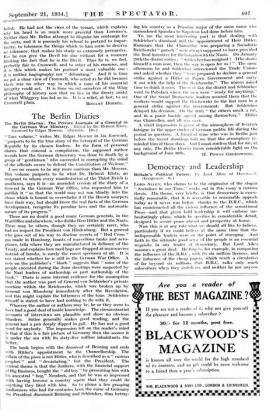The Berlin Diaries
The Berlin Diaries: The Private Journals of a General in . the German War Ministry. Edited by Dr. Helmut Klotz, foreword by Edgar Mowrer. (Jerrold& 18s.) " Tins volume," writes Mr. Edgar Mowrer in his foreword, " purports to be the true story of the betrayal of the German Republic by its chosen leaders. In the form of personal diaries that conceal a compilation, the supposed author reveals how the German democracy was done to death by a group of ' gentlemen ' who succeeded in corrupting the mind of the officials sworn to defend the Constitution of Weimar."
I see no reason to be any more cautious than Mr. Mowrer. This volume purports to be what Dr. Helmut Klotz, an emigrant to whom every manifestation of the Third Reich is anathema, says it is—an amended version of the diary of a General in the German War Office, who requested him to publish it " so that the world may not rim blindly into the chaos which is bound to overwhelm it if the Brown usurpers have their way, but should know the real facts of the German development, recognize its peculiar laws and the automatic nature of its progress."
There are no doubt a good many German generals, in the War Office and elsewhere, who dislike Herr Hitler and the Nazis. - There may be others, though they are certainly rarer, who had no respect for President von Hindenburg. But a general who goes out of his way to disclose secrets of " Red Cross " gas made in Hamburg, boasts of marvellous tanks and aero- planes, tells where they are manufactured in defiance of the Treaty, and explains how mail bags are dropped at manoeuvres instead of bombs, is surely the rarest specimen of all. It is not stated whether he is still in the German War Office. A note on the publisher's " blurb " suggests that " some of the people executed during the June shootings were suspected by the Nazi leaders of authorship or part authorship of the hook." There is some internal evidence for the assumption that the author was part of General von Schleicher's private machine within the Reichswehr, which was broken up by General von Blomberg immediately after . the Revolution, and this might explain the bitterness of the tone. Schleicher himself is stated to have had nothing to do- with it.
Whoever the author or authors may be, he or they seem to have had a good deal of inside knowledge. The circumstantial accounts of interviews are plausible and show no obvious blunders. Satire generally makes good reading, and the general had a pen deeply dipped in gall. He has not a good word for anybody. The impression left on the reader's mind is that if this is a fair picture of Germany then the sooner it is under the sea with its sixty-five million inhabitants the better.
The book begins with the dismissal of Bruning and ends with Hitler's appointment to the Chancellorship. The villain of the piece is not Hitler, who is described as a " curious prophet " and " devastating," but the President. The central theme is that the Junkers, with the financial support of Big Business, bought the " old boy " by presenting him with his ancestral " bog," Neudeck, and that he was so impressed with having become a country squire that they could do anything they liked with him. So to please a few grasping landowners who had for centuries been the curse of Germany the President dismissed Bruning and Schleicher, thus betray- ing his country as a Prussian major of the same name who surrendered-Spandau to Napoleon had done before him.
. To me the most interesting part is that dealing with Schleicher's dismissal and the appointment of Herr Hitler. Rumours that the Chancellor was preparing a Socialistic Reichswehr " putsch " were always supposed to have provided the final incentive for the bargain with the Nazis. On January 28th the diarist writes : " Schleicher has resigned ! If he shows himself a man now, then the way is open for us ! " The same afternoon he and Schleicher interviewed the Trade Unions and asked whether they were prepared to declare a general strike against a Hitler or Papen Government and carry it out with the help of the Reichswehr." The unions asked time to think it over. The next day the diarist and Schleicher went to Potsdam where the men were " ready for anything." One of the Social Democratic leaders assured them that the workers would support the Beichswehr to the last man in a general strike against the Government. But Schleicher delayed his decision. On the 30th " the others smelt a rat, and in a panic hastily agreed among themselves." Hitler was Chancellor, and all was over.
A vivid impression is given of the atmosphere of feverish intrigue in the upper circles of German public life during the period in question. A friend of mine who was in Berlin just before the recent shootings told me that the atmosphere re- minded him of those days. .1nd I must confess that for me, at any rate, The Berlin Diaries throw considerable light on the






































 Previous page
Previous page